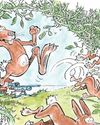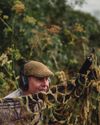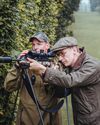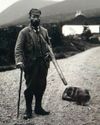
Most of us who work or have worked as a fulltime gamekeeper are aware of how the job evolved and how it has changed in our own lifespan, but just what has happened to gamekeepers in the past 150 years?
The turn of the 19th century saw gamekeeping as a profession heading for its peak in terms of men employed, with some 23,000 full-time gamekeepers being recorded from census records. Just prior to World War II, that number had dropped to 15,000, and today the estimated number of full-time gamekeepers is around the 3,000 mark. So what has happened to all those jobs, and just how many are now single-handed as opposed to being one of a very large team?
The reasons for the decline are complex, and it was not all down to the losses following World War I when substantial numbers of estates were broken up. There was something of a shift in the amount of funds individual landowners were willing to spend on sport for themselves and their friends. As odd days were let to balance the books, it became more of the norm not only to balance them, but to show a black line at the end of the year's accounts. The day of the commercial shoot had arrived, and not only for private owners but for bigger and bigger enterprises with more and more birds per man.
Exception not the rule There were, and still are, large estates with a fair quota of full-time gamekeepers, but they are more of the exception now than the rule.
This story is from the {{IssueName}} edition of {{MagazineName}}.
Start your 7-day Magzter GOLD free trial to access thousands of curated premium stories, and 9,000+ magazines and newspapers.
Already a subscriber ? Sign In
This story is from the {{IssueName}} edition of {{MagazineName}}.
Start your 7-day Magzter GOLD free trial to access thousands of curated premium stories, and 9,000+ magazines and newspapers.
Already a subscriber? Sign In

United we stand
Following United Utilities' decision to end grouse shooting on its land, Lindsay Waddell asks what will happen if we ignore our vital moors

Serious matters
An old gamebook prompts a contemplation on punt-gunning

They're not always as easy as they seem
While coneys of the furry variety don't pose a problem for Blue Zulu, he's left frustrated once again by bolting bunnies of the clay sort

Debutant gundogs
There's lots to think about when it comes to making the decision about when to introduce your dog to shooting

When the going gets rough
Al Gabriel returns to the West London Shooting School to brush up on his rough shooting technique

The Field Guide To British Deer - BDS 60th Anniversary Edition
In this excerpt from the 60th anniversary edition of the BDS's Field Guide To British Deer, Charles Smith-Jones considers the noise they make

A step too far?
Simon Garnham wonders whether a new dog, a new gun and two different fields in need of protection might have been asking too much for one afternoon's work

Two bucks before breakfast
A journey from old South London to rural Hertfordshire to stalk muntjac suggests that the two aren't as far detached as they might seem

Stalking Diary
Stalkers can be a sentimental bunch, and they often carry a huge attachment to their hill

Gamekeeper
Alan Edwards believes unique, private experiences can help keepers become more competent and passionate custodians of the countryside